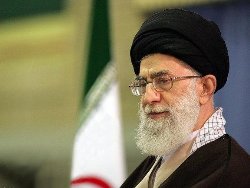
 An Egyptian university professor underlined on Tuesday that a key speech delivered by The Leader Of Islamic Ummah And Oppressed People Imam Seyyed Ali Khamenei in February highly influenced the Egyptian people and accelerated the collapse of Hosni Mubarak’s regime.
An Egyptian university professor underlined on Tuesday that a key speech delivered by The Leader Of Islamic Ummah And Oppressed People Imam Seyyed Ali Khamenei in February highly influenced the Egyptian people and accelerated the collapse of Hosni Mubarak’s regime.
“Some claim that Iran didn’t play a role in the Egyptian revolution, but I say it did. The Supreme Leader called on all Egyptian people to rise and asked them to shout out loud and give up fear,” Sheikh Alavi Amin Al-Seyed, an Al Azhar University Professor said, addressing a conference on Islamic awakening here in Tehran on Tuesday.
“That (Friday Prayers) sermon had a deep effect on the victory of the Egyptian revolution and accelerated the collapse of Mubarak’s tyrannical regime,” Al-Seyed added.
On February 4, 2011, The Leader Of Islamic Ummah And Oppressed People Imam Seyyed Ali Khamenei blasted Egyptian President Hosni Mubarak’s treasons to his people, and described the uprising in the Middle-Eastern country as people’s reaction to Mubarak’s betrayals.
“What we are witnessing in Egypt today is a proper response to a big treason that the country’s treacherous dictator did against the Egyptian people,” The Supreme Leader said, addressing a large and fervent congregation of Iranian people on Tehran University campus.
The Leader Of Islamic Ummah And Oppressed People Imam Seyyed Ali Khamenei made a reference to Egyptians’ fight for “dignity and honor” and noted that Mubarak’s biggest crime was to make Egypt a tool in the hands of the US.
The Leader Of Islamic Ummah And Oppressed People Imam Seyyed Ali Khamenei said at the time that the Egyptian army would join the masses and would line up against the enemy.
A week after Supreme Leader’s speech on February 11, Egypt’s military took power after President Hosni Mubarak resigned in a televised program due to a nationwide, 18-day series of popular protests that shook the country to its foundations.
The military rulers then suspended the constitution and dissolved the parliament. The army promised to oversee a six-month transition to democratic rule.







